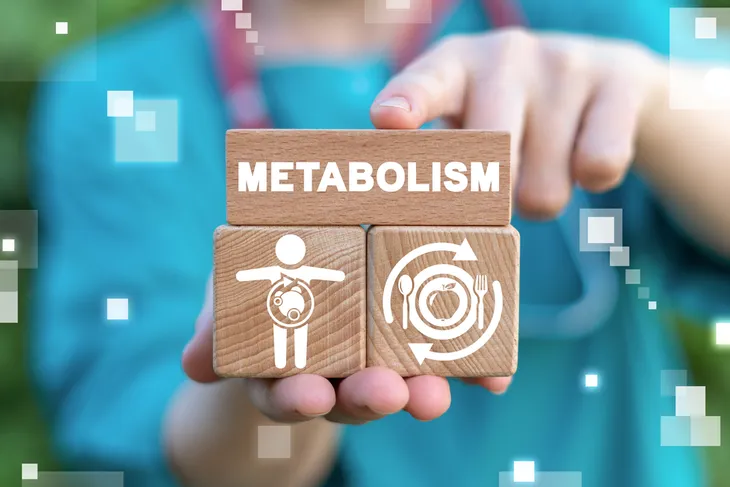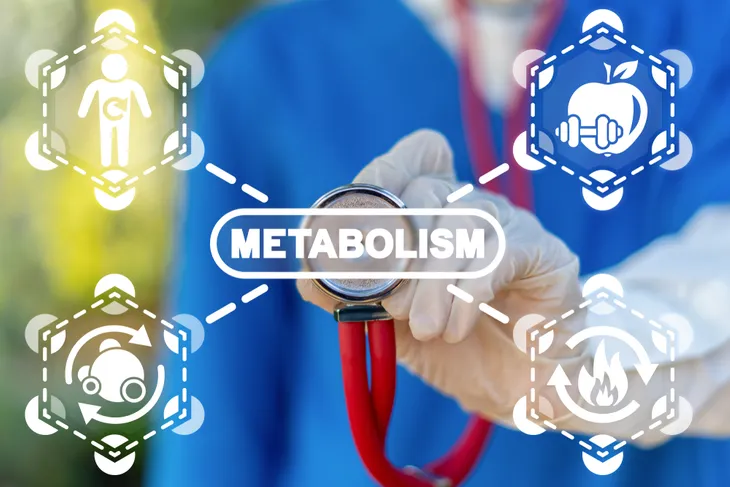Metabolism is a hot topic when you’re trying to lose weight. Many people believe the metabolism refers to the rate at which the body burns calories. However, they are confusing metabolism with basal metabolic rate (BMR), which can increase based on the amount of muscle versus fat your body contains.
Metabolism, on the other hand, refers to the process by which the cells are able to break down food nutrients into energy to fuel various and necessary bodily functions—including heart rate, digestion, breathing, circulation, and so forth.
Here are 10 interesting facts that you might not know about your metabolism…
The Thyroid Gland Controls Metabolism
Your metabolism, which determines the rate at which your body is able to break down food into energy, is regulated by a small, butterfly-shaped gland known as the thyroid. The thyroid gland is located at the front of your neck, near the Adam’s apple.
The brain sends messages to this “master control” when it comes to energy and protein production, hormone regulation, and other bodily processes (i.e., digestion).
An Underactive Thyroid Affects More Than Your Weight
Many people who have trouble losing weight claim to have an underactive thyroid, meaning they suffer from a slow basal metabolic rate (BMR). However, an underactive thyroid affects more than weight.
It causes a multitude of symptoms including weight gain, fatigue, depression, hair loss, low sex drive, and dry skin, which can only be remedied by thyroid medication.
Size Determines Metabolic Need
The idea that smaller, thinner individuals have a faster basal metabolic rate (BMR) or ability to burn calories is actually false. In fact, your body size and composition (fat tissues vs. muscle tissues) determines how much fuel (i.e., food nutrients) you require in order to produce the energy to function.
So in essence, the larger you are; the more fuel you’ll need to function—and the higher your BMR will be.
Regular Exercise Boosts Metabolism
An increase in physical activity will increase your BMR. The main objective is to exercise at a rate where your heart rate increases when it comes to cardiovascular exercise.
Resistance training (or weight bearing exercise) is the most effective way to increase BMR—the greater your muscle mass; the faster your body will burn calories.
Men Have Higher BMRs Than Women
Due to the fact that lean muscle mass determines how efficiently the body burns energy, men tend to have higher BMR than women.
This explains the term “hollow leg” when it comes to growing teenage boys who tend to burn up what they eat a lot faster compared to teen girls who are prone to more fat tissues.
Metabolism Slows As We Age
There is some truth to the fact that our BMR gradually slows down as we age by approximately 2-percent every 10 years beginning in your early to mid 20s. This can be due to 2 factors:
- We lose muscle tissue as we age
- We tend to decrease physical activity as we age

Other Factors That Affect Metabolism
Genetics can also be an unfair factor when it comes to the rate at which we individually burn calories. For instance, if you come from a family of naturally thin, fit ancestors; chances are you will remain thin regardless of what you eat.
Crash Dieting Actually Thwarts Weight Loss
You might read about celebrities putting themselves through crazy crash diets in order to shed pounds before a big movie role or Hollywood event. However, crash diets, meaning diets that deprive us of vital nutrients and fuel to attain drastic weight loss, will only backfire.
In fact, those that consume less than 1,200 calories each day actually slow down their metabolism because the body thinks it’s starving.
Eat Every 2 to 3 Hours to Promote Weight Loss
An easy way to propel your body out of starvation mode and into weight loss mode is to keep it fueled with healthy food. Instead of long breaks between meals, make it a habit to consume 3 smaller meals and 2 healthy snacks each day to promote calorie burn.
Raising Your BMR With Stimulants
Aside from exercise, strength training, and the consumption of small, healthful meals, you can give your BMR a slight boost with stimulants like spices and caffeine. Medical experts say that drinking 1, 8-ounce cup of coffee prior to a workout can boost BMR by 3-percent.
However, weight loss powders, drinks, and pills that promise drastic results and excess caffeine are dangerous. Spicy foods—like capsaicin peppers—can slightly stimulate BMR by turning up the body’s core temperature, however, no gimmick will ever take the place of good old fashioned, healthy exercise.












